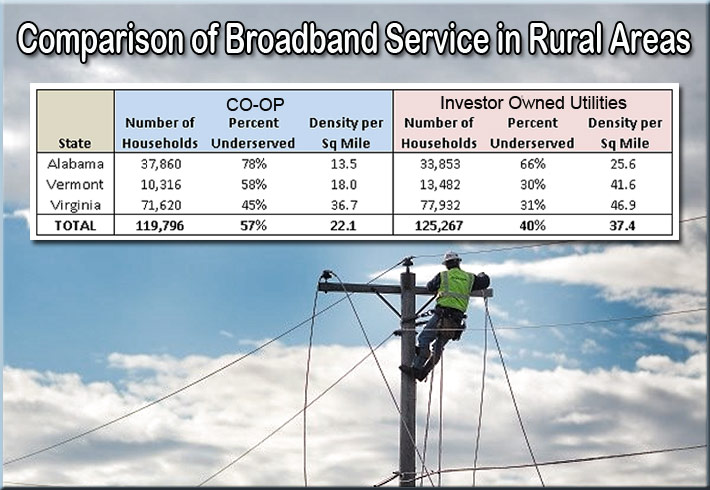
According to the NRECA research, there is a strong correlation between low household density per square mile and lower broadband penetration in rural parts of the country. As shown, the population density in the rural areas served by Investor Owned Utilities (IOU) is nearly double the population density in the rural areas served by electric cooperatives. This difference in population density correlates with lower broadband penetration, 57% unserved in cooperative territory vs. 40% unserved in IOU territory.
Broadband deployment in rural America is not impeded by pole attachment rates, according to a report released by Brian O’Hara, regulatory director, National Rural Electric Cooperative Association (NRECA), in a white paper, “Pole Attachment Policies and Issues.”
O’Hara’s research indicates that most communications companies will not provide broadband to all of rural America even when the pole attachment rental rates are waived entirely.
“When offered low or free pole attachment rental rates, for-profit providers have refused to serve the sparsely populated, rough-terrain areas served by electric cooperatives. Executives at some large cable and telecom providers conceded on multiple occasions that pole attachment rates are not the major barrier and that eliminating the charge altogether wouldn’t necessarily encourage them to deploy to rural areas,” the white paper said.
Other factors, primarily low population density, are more significant factors, NRECA believes.
“This fact has been supported by analyses by the Virginia State Corporation Commission, a Virginia Hearing Examiner, the Tennessee Broadband Report, the U.S. GAO, the Congressional Research Service and recognized by the FCC’s own Intergovernmental Advisory Committee. All demonstrate that cost-based pole attachment rental rates have little, if any, influence on decisions by cable companies and other for-profit communications companies to invest in advanced broadband infrastructure in rural America,” NRECA’s findings state.
The association believes that if pole attachment rates were the barrier claimed, one would expect broadband to be significantly more readily available in rural areas served by large investor owned utilities (IOUs) since they are subject to FCC-regulated pole attachment rates that are generally lower than most electric cooperative rates.
“This is not generally the case. Given this well-established precedent, granting communications company demands for lower pole attachment rental rates is unlikely to result in expanded rural broadband access,” O’Hara said in the extensive report.
NRECA sent a letter to FCC Chairman Pai and FCC Commissioners highlighting the findings in this white paper.
“In numerous instances, electric cooperatives have offered free or reduced pole attachment rates to communications companies if they agree to serve all their cooperative service territory. Unfortunately, no telecommunications or cable provider has taken a cooperative up on their offer. This is further evidence that pole attachment rates are not the determining factor in the decision to deploy broadband in rural areas,” NRECA CEO Jim Matheson said in his correspondence with the FCC.


















